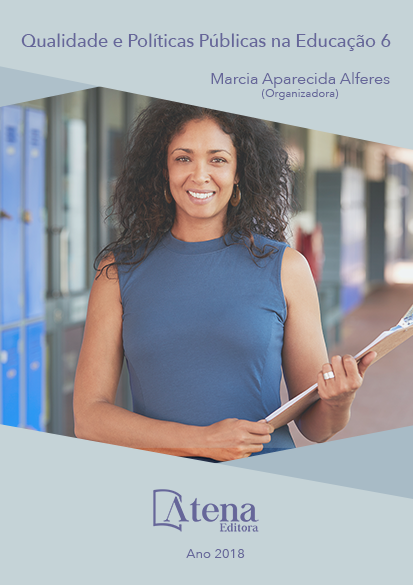
O TRABALHO DOCENTE DIANTE DAS ADVERSIDADES: A (IN)DISCIPLINA NOS ANOS INICIAIS DO ENSINO FUNDAMENTAL
Com a consolidação da globalização,
uma série de mudanças marcaram o início do
século XXI, inclusive na área da educação.
Várias pesquisas, eventos nacionais e
internacionais tem buscado compreender o
que acontece com a “educação”. A facilidade
de acesso aos pensamentos e teorias
desenvolvidas por pesquisadores, escritores e
professores tem contribuído para melhorar a
qualidade da educação. Mas, ao mesmo tempo,
a escola e a família parecem perder o poder
e o espaço que antes detiveram na formação
do indivíduo. O presente trabalho de pesquisa
que tem por objetivo compreender os fatores
que desencadeiam a indisciplina no contexto
escolar, para buscar alternativas que possam
resgatar a disciplina na acepção real da palavra
como instrumento que corrobora com uma
educação consciente e cidadã. Para a coleta
de informações foram entrevistados 50 alunos
dos Anos Iniciais do Ensino Fundamental. Por
meio de entrevista semi-estruturada buscamos
compreender o contexto social onde estas
crianças estavam inseridas, as dificuldades que
encontravam na escola, e ainda seus interesses
e motivações para estudar. Pois acreditamos
que a escola deva funcionar por meio de critérios
adequados à participação e ao diálogo entre os
alunos e destes com os professores, onde o
problema deve ser contextualizado, analisando
suas causas e favorecendo ações alternativas
de solução aos conflitos. A conquista da
cidadania e de uma escola de qualidade é o
que almejam os profissionais da educação.
O TRABALHO DOCENTE DIANTE DAS ADVERSIDADES: A (IN)DISCIPLINA NOS ANOS INICIAIS DO ENSINO FUNDAMENTAL
-
DOI: 10.22533/at.ed.13118191223
-
Palavras-chave: Estudantes. Professores. (In)disciplina.
-
Keywords: Students. Teachers. (In)discipline.
-
Abstract:
With the consolidation of
globalization, a series of changes marked
the beginning of the 21st century, including in
the area of education. Several researches,
national and international events have sought to
understand what happens to “education”. The
ease of access to the thoughts and theories
developed by researchers, writers and teachers
has contributed to improving the quality of
education. But at the same time, school and
family seem to lose the power and space they
once held in the formation of the individual. This
research aims to understand the factors that
trigger the indiscipline in the school context, to
find alternatives that can rescue the discipline in the real meaning of the word as an instrument that corroborates with a conscious
and citizen education. Fifty students from the Initial Years of Elementary School were
interviewed to collect information. Through a semi-structured interview we sought to
understand the social context where these children were inserted, the difficulties they
encountered in school, and their interests and motivations to study. For we believe
that the school should function by means of adequate criteria for participation and
dialogue between students and teachers and students, where the problem must be
contextualized, analyzing its causes and favoring alternative actions to solve conflicts.
The achievement of citizenship and a quality school is what education professionals
aim for
-
Número de páginas: 15
- Liane Nair Much


